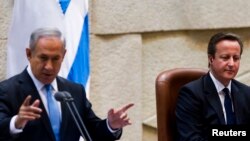Visiting British Prime Minister David Cameron addressed Israel's parliament Wednesday, denouncing Iran's government as a "despotic regime" and accusing Tehran of carrying out "despicable" efforts to arm Palestinian militants.
Cameron said Britain will stand alongside Israel in opposing a nuclear Iran and combating Islamic extremism.
He also said he would fight efforts to boycott Israel or try to "delegitimize" it. Some businesses and pension funds in Europe have cut investments or trade with Israeli firms they say are connected to Jewish settlements.
The Conservative British leader, on his first visit to Israel since taking power in 2010, also used his speech to throw support behind U.S. efforts to clinch an elusive Israeli-Palestinian peace deal.
But he said global tensions over what Israel and the West fear is Iran's pursuit of nuclear weapons, were likely to persist even if the generations-old Middle East conflict was resolved.
Iran denies seeking atomic arms, saying its nuclear program is for civilian use only.
Also Wednesday, Palestinian militants in the Gaza Strip fired at least 20 rockets into southern Israel, the heaviest such barrage in two years.
The rocket fire, which police said caused no casualties, was claimed by the Islamic Jihad group and came a day after Israel killed three of its members in a Gaza air strike.
Another Gaza militant group, the Popular Resistance Committees, said it fired several rockets as well.
Tehran-backed Islamic Jihad has killed dozens of Israelis in suicide bombings and other attacks over the years.
Israeli Prime Minister Benjamin Netanyahu reacted to the rocket barrage by pledging to act "very forcefully" against anyone seeking to harm Israel.
Cameron said Britain will stand alongside Israel in opposing a nuclear Iran and combating Islamic extremism.
He also said he would fight efforts to boycott Israel or try to "delegitimize" it. Some businesses and pension funds in Europe have cut investments or trade with Israeli firms they say are connected to Jewish settlements.
The Conservative British leader, on his first visit to Israel since taking power in 2010, also used his speech to throw support behind U.S. efforts to clinch an elusive Israeli-Palestinian peace deal.
But he said global tensions over what Israel and the West fear is Iran's pursuit of nuclear weapons, were likely to persist even if the generations-old Middle East conflict was resolved.
Iran denies seeking atomic arms, saying its nuclear program is for civilian use only.
Also Wednesday, Palestinian militants in the Gaza Strip fired at least 20 rockets into southern Israel, the heaviest such barrage in two years.
The rocket fire, which police said caused no casualties, was claimed by the Islamic Jihad group and came a day after Israel killed three of its members in a Gaza air strike.
Another Gaza militant group, the Popular Resistance Committees, said it fired several rockets as well.
Tehran-backed Islamic Jihad has killed dozens of Israelis in suicide bombings and other attacks over the years.
Israeli Prime Minister Benjamin Netanyahu reacted to the rocket barrage by pledging to act "very forcefully" against anyone seeking to harm Israel.





